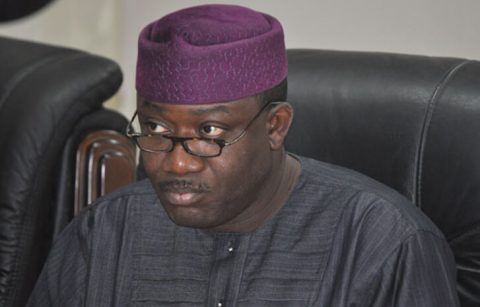COVID-19: Governors Working With FG On Vaccine Procurement -NGF
African News, Featured, Latest Headlines, News, News Across Nigeria, News From The State Wednesday, February 3rd, 2021
(AFRICAN EXAMINER) – The Nigeria Governors’ Forum on Tuesday said it was working with the Federal Government to make Coronavirus vaccines available in the country.
The Forum’s Chairman and Governor of Ekiti State, Dr Kayode Fayemi, said this while delivering a lecture titled “The role of Nigeria’s state governments in recovery: responses to COVID-19 linked challenges’’ at Chatham House Event, London, UK.
Fayemi, in his speech made available to correspondents in Abuja, said that the COVID-19 pandemic had caused significant disruptions to the health and economy of nations, including Nigeria.
“We expect that about 80 million doses of vaccines will be made available in 2021 to cover 40 per cent of the population, while another 60 million doses are being planned ahead of 2022.
“Beyond government’s procurement of vaccines, we at the NGF are also strong proponents of the utilisation of Public-Private Partnerships in vaccines procurement as a means of closing the gap between what is available and what is necessary to achieve immunity.
“As we already know, vaccines themselves are not cost effective, but rather immunisation is.
“To ensure people are immunised, State Governments have a role to play in supporting the logistics and ensuring people get the vaccines.’’
Fayemi said that using the Vaccines Readiness Assessment Tool (VRAT), governors were encouraged to revisit and strengthen their vaccines cold chain and logistics, step up demand creation and communication.
He added that governors had also been enjoined to map out priority persons to receive vaccines amongst other things.
“Plans must also be comprehensive enough to address other areas that could create a logistical nightmare such as storing vaccines, reaching out and ensuring people come back to receive their second doses.
“We have considerable experience on this, having handled polio vaccination which actually led to the eradication of wild polio virus in Nigeria.
“On the economic front, our major priority is to secure livelihoods. National monetary and fiscal policy reforms must align to support improvements in household income.’’
He said it was unsurprising that Nigeria GDP contracted by 3.5 per cent in 2020 given the impact of the second wave of the pandemic, saying it is unlikely that we see GDP growth recovery to pre-pandemic levels in 2021.
Fayemi said that the macro-economic challenges coupled with double digit inflation and falling per capita income had real life implications on lives and livelihoods and were of concern to government.
He said that working with the Federal Government, a number of employment creation programmes were identified and currently being implemented to reduce the impact on the citizens and the country.
“The Central Bank of Nigeria (CBN) has played an important role here and we must commend the officials.
“Intervention funds have been made available with interest rates below inflation, with the hope that we can stimulate growth of small and medium scale businesses.
“Similarly, institutions such as the Bank of Industry and Bank of Agriculture have also given moratoriums on existing loans to ease the burden of payment.’’
Fayemi added that looking forward to recovery from the impact of the COVID-19 pandemic, Nigeria approach must shift from emergency response to strengthening the resilience and sustainability of the country’s health system.
“We must task ourselves and rethink on existing assumptions and facts around financing and delivery of health care in a manner that guarantees we build back better.
“This requires adequate funding of the health sector. We have begun to advocate for increased investment in health security and public health emergencies by State Governments.
“In Ekiti State for example, our capital budget for health in 2021 increased by 250 per cent above 2020 figures.
“Our new four-year strategy for the health sector has public health security as a major priority.
“At the NGF, we are recommending that states begin to think about establishing their own Centres for Disease Control.’’
Fayemi added that in the medium to long term, Nigeria must begin to think strategically about the future of public health security.
He added that Nigeria must explore the potential of in-country manufacturing of approved vaccines, following technology transfer.
“The pandemic is a good reminder of the implications of public health outbreaks on national security.
“We must take the leap and gain a better level of independence in the area of vaccine research and development, but also science generally.’’
Fayemi also recommended that all sector must take ownership of health security.
“Public health is not for the health sector alone as is popularly practiced in countries including Nigeria.
“The COVID-19 pandemic is perhaps our biggest lesson around this, as the pandemic has affected all spheres of the economy.
“Nigeria now has a National Action Plan for Health Security (NAPHS) that includes a multi-sectoral approach to prepare for and respond to disease outbreaks.
“Every sector must now contribute to ensuring health security and this is not limited to the provision of funds alone.
“Many of the determinants of health are outside the health sector, and so we must have multi-sectoral leadership and response to public health emergencies.’’
(NAN)
Related Posts
Short URL: https://www.africanexaminer.com/?p=59476






















